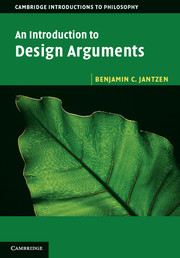Book contents
- Frontmatter
- Dedication
- Contents
- List of figures and tables
- Preface
- 1 Introduction
- 2 Preliminaries
- 3 Arguments from antiquity
- 4 Medieval arguments
- 5 The golden age of natural theology
- 6 Unusual design arguments
- 7 Hume
- 8 Paley
- 9 Darwin
- 10 Loose ends
- 11 The modern likelihood argument
- 12 Intelligent design I: irreducible complexity
- 13 Intelligent design II: specified complexity
- 14 What is complexity?
- 15 Supernatural agents and the role of laws
- 16 A brief survey of physical law
- 17 Fine tuning I: positive arguments
- 18 Fine tuning II: objections
- 19 Conclusion
- Bibliography
- Index
11 - The modern likelihood argument
Published online by Cambridge University Press: 05 June 2014
- Frontmatter
- Dedication
- Contents
- List of figures and tables
- Preface
- 1 Introduction
- 2 Preliminaries
- 3 Arguments from antiquity
- 4 Medieval arguments
- 5 The golden age of natural theology
- 6 Unusual design arguments
- 7 Hume
- 8 Paley
- 9 Darwin
- 10 Loose ends
- 11 The modern likelihood argument
- 12 Intelligent design I: irreducible complexity
- 13 Intelligent design II: specified complexity
- 14 What is complexity?
- 15 Supernatural agents and the role of laws
- 16 A brief survey of physical law
- 17 Fine tuning I: positive arguments
- 18 Fine tuning II: objections
- 19 Conclusion
- Bibliography
- Index
Summary
Probability, likelihood, and Bayes’ Theorem
The first argument we’ll consider from the modern era is a special sort of inference to the best explanation for which the vague term ‘best’ is given a rigorous formulation in terms of something called the ‘Likelihood Principle’. To understand this version of the design argument, we need to be clear about some basic features of probability, so we’ll begin this chapter with a quick review.
While it is easy to present the mathematical theory of probability – the probability calculus – it is difficult to give an account of just what probability is. This is because there are many different processes or features of the world that are well modeled by the probability calculus, just as many things can be modeled with algebra or geometry. There is likely no one thing that probability is really about, and in our discussion we’ll see the calculus of probability applied in at least two different ways. On the one hand, probability describes processes that we think of as genuinely or inherently chancy – processes like the flip of a coin, the spin of a roulette wheel, or the decay of an atom. We tend to think that in at least some of these cases, there is no way in which the world must turn out – the coin could come up heads or tails – but the patterns in which such events are found to occur is well modeled by probability theory. The calculus lets us know what to expect. On the other hand, the probability calculus is good at modeling the ways we should change our beliefs about the world when we lack total information, at least if we want to be rational in certain ways. In this sense, probability is a measure of our degrees of belief. I won’t try to argue for any one interpretation of the probability calculus (in part because I don’t believe there is a unique interpretation), and an examination of the difficult questions surrounding the notions of randomness, chance, and ‘degrees of belief’ will lead us too far astray. Instead, I’ll motivate the parts of the mathematical theory we’ll need with an intuitive example involving a chance process. Once we have the math down, I won’t stipulate an interpretation unless it is relevant.
- Type
- Chapter
- Information
- An Introduction to Design Arguments , pp. 170 - 188Publisher: Cambridge University PressPrint publication year: 2014



